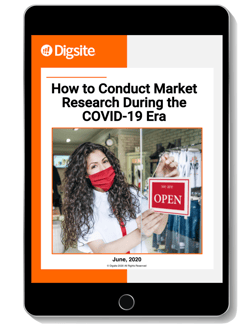A tourism industry client of ours recently placed a research project on hold because they want the timing of their research to align with the loosening of travel restrictions. They simply weren’t sure consumers could envision travel right now. It was a good decision to wait.
Another client went forward with a research project that was planned well before COVID-19 – they assessed, correctly, that the pandemic would not prevent them from understanding what they were trying to learn.
As COVID-19 cases begin to spike again in many parts of the country, it’s clear that we are not going to return to business as usual anytime soon – we will likely have many “aftershocks” in the coming months.
With no clear “back to normal” in sight, qualitative and quantitative research is helping many companies improve outcomes and better plan for contingencies.
Yet there is a great deal of uncertainty around how, and if, to proceed with market research, including:
- Concern that behavioral data is too volatile to be predictive
- Legal and ethical considerations around conducting in-person research
- Questions around the value of research in a rapidly changing environment
How can you determine what type of research to do, and if it is worth the investment? Certain types of research make sense now, and, as with the travel example I mentioned earlier, some types of research don’t. For instance, making large investments in foundational research may not be a good idea at this time, given consumer behaviors are changing week to week. Instead, researchers are turning to smaller scale, rapid experimentation and iteration.
This volatile market behavior has also created problems with data modeling. Pavi Gupta, Johnson & Johnson Vision Head of Insights and Analytics, says that companies that have relied on analytics teams for forecasting have been stalled by data issues, since coronavirus is causing so much volatility. This creates more reliance on other types of research to fill in the gaps and inform new data models.
Quantitative research to avoid now
- Research you need a shelf life of 12 months or more to get a solid ROI, such as large-scale segmentation or foundational A&U investment
- Large-scale volume estimation for ideas launching in six months or more. These results may not be very helpful in forecasting revenue due to rapidly changing consumer behaviors
- Predictive data analytics projects, which have been hampered by instability and large amounts of outlier data
Qualitative research to avoid now
- Behavioral testing outside the home – make sure to follow federal and state guidelines and consider the safety of consumers, vendors and employees
- Product testing that doesn’t fit current consumer behavior, such as travel products they can’t experience now
Research that makes sense now
A mix of agile, qualitative and quantitative methods can help you quickly, repeatedly, and cost-effectively get the research you need to move forward. Some examples include:
- B2B topics relevant to business needs now, like optimizing products, services and experiences
- New product concepts relevant to consumers now, like food, entertainment, safety and home products
- Transitional A&U exploration to track consumer priority shifts in areas like travel and holiday gift buying
- Corporate and brand communication to help ease consumer stress and fear
- Traditional and social ad testing to determine the most relevant messaging
- Product research for near-term launches to assess early adoption and build volume forecasts
- Customer service and experience support to help improve online experiences for people used to phone or in-person services
Where you can learn more
Our latest eBook, How to Conduct Market Research During the COVID-19 Era, is a deep dive into market research, including insights from three recent Digsite qualitative research studies with a cross-section of consumers, ages 21-60, from a mix of ethnicities and U.S. regions. The eBook explains how research participants are responding differently during the COVID-19 crisis, the top four ways to conduct online qualitative research during COVID-19, and includes case studies with real-world companies that have successfully conducted research during COVID-19.





